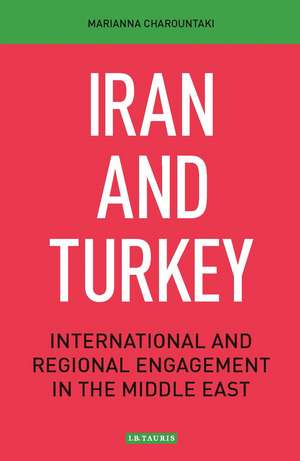Iran and Turkey: International and Regional Engagement in the Middle East
Autor Marianna Charountakien Limba Engleză Hardback – 26 mar 2018
| Toate formatele și edițiile | Preț | Express |
|---|---|---|
| Paperback (1) | 175.07 lei 3-5 săpt. | +23.97 lei 4-10 zile |
| Bloomsbury Publishing – 18 sep 2019 | 175.07 lei 3-5 săpt. | +23.97 lei 4-10 zile |
| Hardback (1) | 599.25 lei 6-8 săpt. | |
| Bloomsbury Publishing – 26 mar 2018 | 599.25 lei 6-8 săpt. |
Preț: 599.25 lei
Preț vechi: 859.07 lei
-30% Nou
Puncte Express: 899
Preț estimativ în valută:
114.70€ • 124.63$ • 96.41£
114.70€ • 124.63$ • 96.41£
Carte tipărită la comandă
Livrare economică 21 aprilie-05 mai
Preluare comenzi: 021 569.72.76
Specificații
ISBN-13: 9781788311809
ISBN-10: 1788311809
Pagini: 368
Ilustrații: 3 maps, 2 figures
Dimensiuni: 138 x 216 mm
Greutate: 0.57 kg
Editura: Bloomsbury Publishing
Colecția I.B.Tauris
Locul publicării:London, United Kingdom
ISBN-10: 1788311809
Pagini: 368
Ilustrații: 3 maps, 2 figures
Dimensiuni: 138 x 216 mm
Greutate: 0.57 kg
Editura: Bloomsbury Publishing
Colecția I.B.Tauris
Locul publicării:London, United Kingdom
Notă biografică
Marianna Charountaki is a Lecturer in Kurdish Politics and International Relations in the School of History, Politics and International Relations at the University of Leicester, where she is also the Head of the Kurdistan International Studies Unit. Her research interests range from international relations and foreign policy analysis to the international relations of the broader Middle East. She has published the monograph The Kurds and US Foreign Policy: International Relations in the Middle East since 1945 (2010) as well as articles in the journals Journal of American Foreign Policy Interests, Third World Quarterly and Journal of Arabian Studies.
Cuprins
Chapter 1Introduction Literature Review: A critique Determinants of Turkish-Iranian relations: A justification Methodology: An Interdisciplinary and Comparative Examination from a Multi-actor PerspectiveConclusion Chapter 2 Determinants of the Iranian- Turkish relations: A Historical ReviewThe Role of the Elites: Army and Ulama versus Army and Ayatollahs Turkish versus Iranian Republicanism: International Interference as an External Force The Influence of the Cold War on Turkish-Iranian Politics Islamist Turkey versus Islamic Iran: The Impact of Foreign Policy Principles Conclusion Chapter 3 Turkey-Iran Relations during the Cold War The Iranian Revolution and its Impact on the Cold War Non-state Actors as Facilitator of State Foreign Policy Iraq as factor under the prism of Gulf War I External Interference: The US Role versus Soviet Influence Economics of War: Iranian-Turkish Economic and Political AlliancesConclusion Chapter 4Turkish-Iranian Relations in the 1990s: The Impact of Gulf War II and the Consolidation of the Kurdish StatusThe Impact of Gulf War II on Turkish-Iranian relations Gulf War II and its Aftermath: The Role of the Kurds Conclusion Chapter 5The Iraq War and the Rise of Non-state actors (2001-2010)The Role of Iraq in the formulation of Turkish- Iranian relations: Political and Economic Considerations Non-state Actors in Iranian and Turkish foreign policies: The Kurds as A Force for Change Iranian-Turkish Rapprochement: International and Regional Structures Epilogue: Towards A Conceptual Analysis Conclusion Chapter 6Turkish- Iranian Relations under the Lens of the Syrian Crisis: A New Era for Middle Eastern Politics The Syrian FactorConclusionChapter 7Conclusions and Conceptualisations Empirical and Conceptual Implications A New Pattern of Alliances: The International Dimension Theoretical Framework: A model of multi-dimensional interrelationsConclusion List of Figures Appendix Bibliography
Recenzii
There is a vital need for this book. Summing Up: Recommended. Upper-division undergraduates through faculty.
